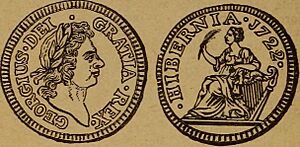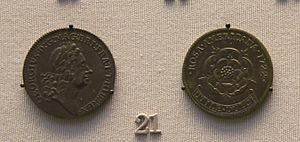William Wood (ironmaster) facts for kids
William Wood (1671–1730) was an English businessman who made metal goods. He was known for getting a special agreement to make coins for Ireland between 1722 and 1724. He also made coins called 'Rosa Americana' for the American colonies during the same time.
Wood's Irish coins were very unpopular. People in Ireland thought they were bad for their economy. A famous writer named Jonathan Swift wrote letters criticizing these coins. Because of the protests, the coins were taken back and sent to the American colonies instead. Later, Wood tried a new way to make iron, but it didn't work well. He used this idea as part of a plan to trick investors.
Contents
Family Life of William Wood
William Wood was born in Wolverhampton, England. His father, Francis Wood, was a silk weaver. William married Margaret Molineaux in 1690. Her father, Richard Molineaux, was an ironmonger from Willenhall.
William and Margaret lived in a large house in Wolverhampton called The Deanery. They had 14 children together.
William Wood's Career
Becoming an Ironmonger
After he got married, William Wood started a business with his father-in-law, Richard Molyneux. They made and sold metal goods in Wolverhampton. Not much is known about this part of his business. Later, in 1723, his wife's brothers, John and Daniel Molyneux, said they had nothing to do with William Wood's coin business.
Becoming an Ironmaster
In 1715, William Wood decided to expand his business. He applied to collect land taxes for the county of Shropshire. He also started a big partnership to make and sell iron and steel. He wanted to make money from the political changes happening in England at the time.
In 1714, he joined with Thomas Harvey and others to run a brass and iron mill. They built new ironworks, including Sutton Forge and Bersham Furnace. They also had other furnaces for a while. In 1717, he helped build a blast furnace at Rushall. They even planned to use coke as fuel, which was a new idea back then.
In 1720, Wood announced a plan for a new company to make iron, copper, and brass. He hoped to make money by selling shares in this company. By 1723, Wood also owned the Falcon Iron Foundry in Southwark, London. He put his son William in charge of that factory.
The Unpopular Halfpence
William Wood wanted to make money by producing coins for Ireland and America. In 1722, the King's friend, the Duchess of Kendal, got a special permission to make copper coins for Ireland. Wood thought this would be a good business, so he bought this permission from her for £10,000.
The King, George I, gave Wood permission to make a lot of halfpence and farthings for Ireland. These coins were made in London starting in 1722. They were heavier than other copper coins used in Ireland at the time. Wood also made lighter coins called Rosa Americana for the American colonies.
Wood's Irish coins became very unpopular in Ireland. People worried that new copper coins would make gold and silver coins leave the country. They also thought there were already enough small coins. The Irish Parliament complained to the King in 1723. They said the coins could cause prices to go up and hurt trade. They also didn't like how Wood got the permission secretly.
Many people spoke out against Wood's coins. Jonathan Swift, a famous writer, wrote a series of popular letters called Drapier's Letters. Swift was angry that the permission was given to a private person in England without asking Irish leaders. He also claimed Wood's coins were poor quality and easy to fake.
Even though Sir Isaac Newton, who was in charge of the Royal Mint, said the coins were good, people in Ireland still didn't trust them. They pointed out that Wood himself chose the coins for Newton to test. The argument grew into a bigger debate about Ireland's rights. Because of all the protests, Wood's halfpence and farthings were eventually taken back.
As a way to make up for his loss, Wood was given £3000 a year for eight years. However, he only received this money for three years before he died on August 2, 1730. A famous Irish musician, Turlough O'Carolan, even wrote a song about Wood's failure called "Squire Wood's Lamentation."
New Iron-Making Ideas
William Wood's son, Francis, came up with a way to make iron using coal. He got a patent for this idea in 1727. In 1728, William Wood himself got a new patent for his son's iron-making process. He tried to get money for this by promising to supply a lot of iron to a company called the United Company of Mines Royal.
Wood built a large factory in Frizington Moor, England. It was 375 feet long and had 11 furnaces. He kept his new iron-making process a secret. However, reports showed that the factory was having problems. The company that gave him money didn't receive much iron from Wood.
After failing to get more money, Wood wanted to start a huge company called the "Company of Ironmasters of Great Britain." This company would have had a lot of money, but people worried it was just a way to trick investors. The government started an investigation, and then William Wood died.
The government later helped pay for furnaces to show off the process. A test was done in 1731. Blacksmiths said the iron made by Wood's process was weaker and harder to work with than regular iron. This bad report ended the plans for the new company.
William Wood's Descendants
William's son, John, later started his own iron business in 1740. He developed important new ways to make iron.
Another son, Charles Wood, was involved in finding platinum. He also helped develop new iron-making methods with his brother John. Charles built the Cyfarthfa Ironworks in Wales, which was a very important iron factory.
Some of William Wood's sons and his son-in-law faced financial problems and went bankrupt after his death.
William Wood was also an ancestor of the famous Victorian writer Mary Howitt. She wrote about her family's history. He was also related to the poet Armine Kent and the architect Arthur Blomfield.
See also
- Coins of British America
- Coins of Ireland
 | Frances Mary Albrier |
 | Whitney Young |
 | Muhammad Ali |



